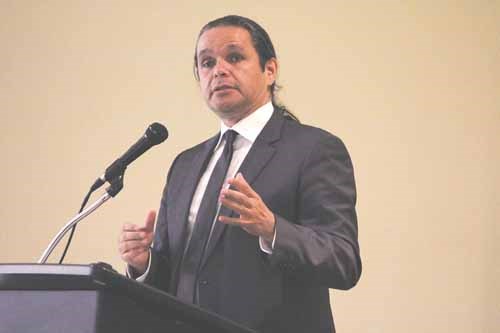Bernd Christmas, Canada's first Mi'kmaw lawyer and a highly respected advisor to business and government, spoke directly on the subject that many attendees came to hear about at last week's TransACTIONs conference: economic growth on First Nations reserves.
The Membertou band where Christmas grew up-located within the city of Sydney, Nova Scotia-is a case study of First Nations success, and Christmas played a significant part in its turnaround.
When Christmas was called back home from a law firm in Toronto by his band chief in the early 1990s, Membertou was in poor shape. Already weakened by some bad deals with the municipal and federal governments, it was hit harder than most by the economic downturn afflicting the area at the time. Christmas was appointed director of operations to a nearly bankrupt reserve.
It was clear to Christmas and the rest of the band leadership that the way out of poverty for Membertou was economic development.
This required, first and foremost, a shift in attitude. The band had to look beyond its borders and actively pursue opportunities. The members had to acknowledge the wrongs that were done against them, but refuse to see themselves as victims. They had to stop viewing "profit" as a dirty word, and instead as a means to build services that the government wouldn't provide. They had to slash budgets while at the same time increasing transparency.
"One of the biggest barriers that we're facing as Aboriginal communities is that people think that it's all behind closed doors-there's no accountability," Christmas said. "Rightly or wrongly, you've got to break down those perceptions and say, 'No, this is what's going on.'"
Their potential partners in business and government needed an attitude change as well. Many of them saw reserves as fundamentally foreign entities and bottomless money pits. The Membertou leadership reminded them that reserves could be equal partners, and that money acquired by the band is spent locally.
"We are part of the economy. People for some reason forget that," said Christmas.
At the time, the reserve's sole source of income was $4.2 million in funding from Indian Affairs. They approached the ministry with a request for an additional $1.8 million and, armed with a plan detailing exactly what they intended to do with the money, were granted it.
The band hired a team of employees with highly specialized knowledge of the business and government worlds, while also looking inward for promising band members suitable for promotion. The changes improved the band's toolset while at the same time energizing the membership.
Membertou began aggressively pursuing business opportunities. Christmas recalls hunting down the phone numbers of restaurant chain CEOs and wrestling promises out of them to build franchises at the reserve.
Soon, the opportunities began to present themselves. Membertou built strip malls, a convention centre, a data storage centre, and industrial plants. The First Nation that had been bankrupt a few years earlier now had an operating budget of $65 million. Today, it employs 531 people, funds career training for its residents, pays for its own police force, and owns its own school.
Membertou First Nation had numerous advantages that are not shared by all reserves, but Christmas believes most of the same principles that saved his home community can be applied anywhere.
The Canadian government will never be able to compensate the First Nations people of Canada for all the wrongs it has done against them, Christmas said. That leaves it up to each individual band.
"We have to figure out: are we going to stay this way, or are we going to move forward?
"It's a matter of coming together and recognizing everyone's weaknesses as well as strengths."



